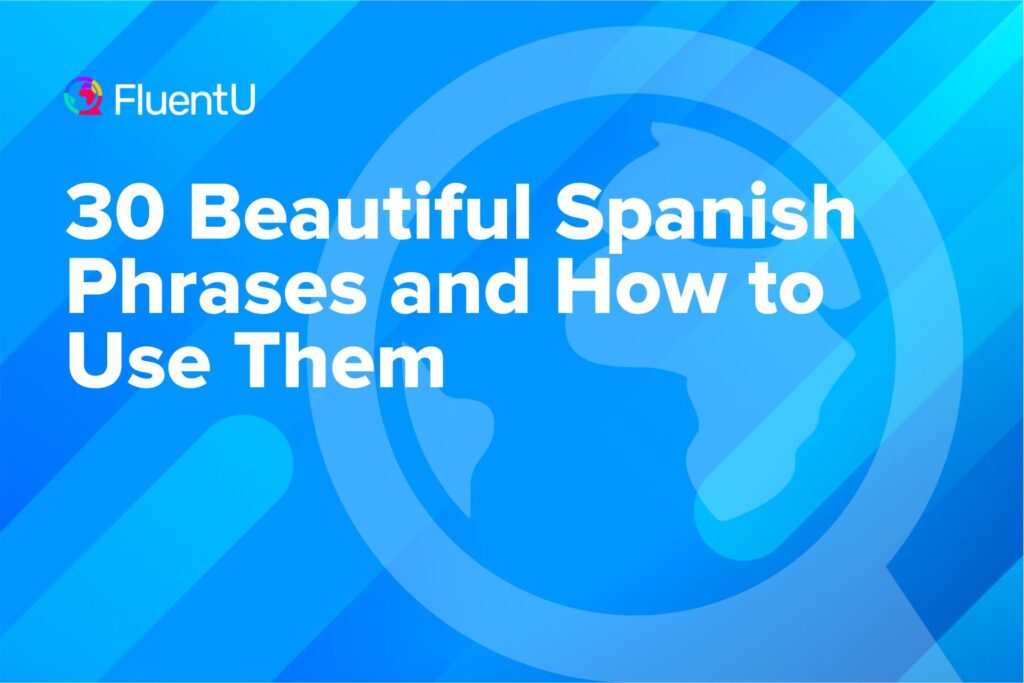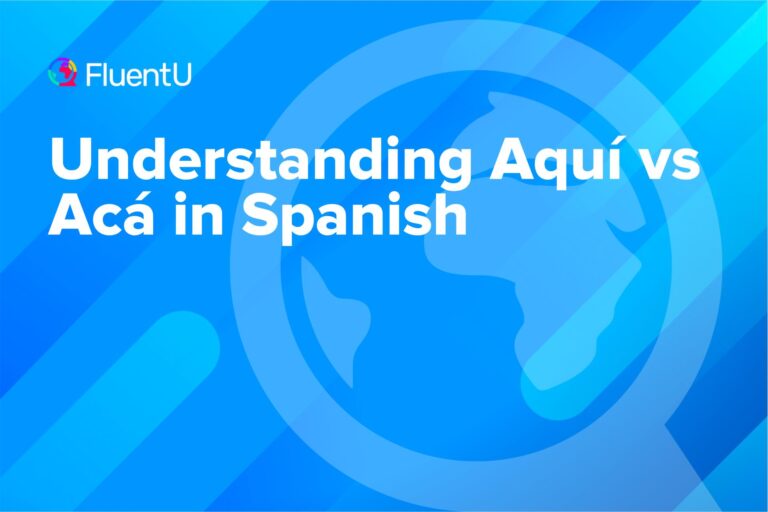Contents
- 1. Encontrar a tu media naranja
- 2. Buscar las cosquillas
- 3. Estar en su (propia) salsa
- 4. Ser el perejil de todas las salsas
- 5. El mundo es un pañuelo
- 6. Cruzar el charco
- 7. Haber cuatro gatos
- 8. Echar el gancho
- 9. Hablar por los codos
- 10. Faltarle un tornillo
- 11. Estar entre Pinto y Valdemoro
- 12. Ir de la Ceca a la Meca
- 13. Irse por los cerros de Úbeda
- 14. Salir de Málaga y entrar en Malagón
- 15. Írsele el santo al cielo
- 16. Llegar y besar el santo
- 17. Matar el gusanillo
- 18. Ser un cero a la izquierda
- 19. Cruzársele los cables
- 20. Apretarse el cinturón
- 21. Pasar al otro barrio
- 22. Pegársele a alguien las sábanas
- 23. Quemarse las pestañas
- 24. Meterse a alguien en el bolsillo
- 25. Devolver la pelota
- 26. Cortar el bacalao / Tener la sartén por el mango
- 27. Tener las manos largas
- 28. Tener buena percha
- 29. Tirar la casa por la ventana
- 30. Vivir en el quinto pino
- And One More Thing…
30 Beautiful Spanish Phrases and How to Use Them

Many words are easily forgotten—but not when they’re beautiful. Plus, there’s no better way to make your Spanish sound authentic than to adopt the most common and adored phrases in the Spanish language.
In this post, you’ll learn 30 beautiful Spanish phrases to express yourself authentically, feel inspired, give you ideas of things to say to your loved ones and more.
Download: This blog post is available as a convenient and portable PDF that you can take anywhere. Click here to get a copy. (Download)
1. Encontrar a tu media naranja
Translation: To find your half orange
Meaning: To find your other half or your soulmate, the person who complements you perfectly
(I’m sure that this time I’ve found my other half with Javier. He’s exactly what I need.)
Another similar expression to this one in Spanish is encontrar la horma de su zapato (to find the mold of your shoe). By “mold” I mean the cardboard filler that you pull out of a new pair of shoes after you’ve bought them. Still beautiful, but I prefer media naranja .
2. Buscar las cosquillas
Translation: To search for the tickles
Meaning: To look for ways to annoy someone; to look for someone’s weak spot
¡No me busques las cosquillas! Estoy muy irritada y no quiero que me molestes.
(Quit messing with me! I’m really annoyed and I don’t want you to bother me.)
Yo le busqué las cosquillas a mi hermano, pero no conseguí que reaccionara.
(I tried to tease my brother but couldn’t get any reaction out of him.)
3. Estar en su (propia) salsa
Translation: To be in your (own) sauce
Meaning: To be in your element
(I’m in my element at the new job. I’m very passionate about art and now I’m paid to spend all day drawing.)
This is perhaps my favorite of all these beautiful phrases because it evokes some pretty hilarious images. Here’s another Spanish phrase that also has to do with sauce…
4. Ser el perejil de todas las salsas
Translation: To be the parsley of all the sauces
Meaning: An unwelcome, nosy person who gets into everyone’s business
Enrique se mete en todo y quiere saber todo. Es el perejil de todas las salsas.
(Enrique sticks his nose in everyone’s business and wants to know everything. He’s a meddling nuisance.)
In Spanish cuisine, parsley is an herb widely used to make all different kinds of salsas. That is, it tends to find its way into every sauce just like a nosy person might manage to get involved in other people’s lives.
5. El mundo es un pañuelo
Translation: The world is a handkerchief
Meaning: Similar to our “it’s a small world after all” or “what a small world,” this expression is used when people run into each other in a strange or faraway place
(Today I ran into an old friend from college at the supermarket. It’s a small world after all!)
It can also be used in other contexts, such as when you find out that you and another person you are talking to know the same person.
6. Cruzar el charco
Translation: To cross the puddle
Meaning: To cross the ocean, especially the Atlantic
En 2013 crucé el charco para vivir en España y no he vuelto todavía.
(In 2013 I traveled across the Atlantic to live in Spain and I haven’t returned since.)
It’s quite beautiful and silly to think of the Atlantic as an obstacle as small as a puddle, but in our modern, globalized world, it’s not too far from the truth!
7. Haber cuatro gatos
Translation: To be four cats
Meaning: When there’s practically no one inside of a place
(We were going to go to the new bar, but it was practically empty so we decided to go to our usual spot instead.)
This idiom is used when you want to say that there are or were very few people present, similar to “there’s hardly anyone” in English.
8. Echar el gancho
Translation: To throw the hook
Meaning: To make someone fall in love with you by seducing them, to capture someone
Irene le echó el gancho al hermano de Miguel el año pasado y este año se casan.
(Irene seduced Miguel’s brother last year and this year they are getting married.)
La policía le ha echado el gancho al ladrón.
(The police have captured the thief.)
9. Hablar por los codos
Translation: To talk through the elbows
Meaning: To talk non-stop, to talk too much
Su hermana es una chica muy pesada. Habla por los codos y no hay quien la pare.
(Her sister is annoying. She talks so much and there is no one who can stop her.)
This idiom is commonly used to refer to someone who talks too much without saying anything particularly relevant.
Some similar phrases are hablar como los loros (to talk like parrots) and enrollarse (to run your mouth.)
10. Faltarle un tornillo
Translation: To be missing a screw
Meaning: To be a little crazy/deranged, to have a screw loose, to be one fry short of a happy meal, a few strings short of a racket, off your rocker, etc.
Me parece que le falta un tornillo porque a los diez minutos me pidió matrimonio.
(I think he’s a little crazy because he asked me if I wanted to marry him ten minutes into our conversation.)
In Spain, another similar idiom that could be used to say the same is andar mal de la azotea , literally meaning “to be wrong in the roof terrace.” In this case, “azotea” (roof terrace) is used to refer to the mind.
11. Estar entre Pinto y Valdemoro
Translation: to be between Pinto and Valdemoro (two Spanish villages)
Meaning: To be indecisive when faced with choosing between two or more options
Sobre este asunto yo estoy entre Pinto y Valdemoro.
(I’m undecided concerning this matter.)
(My parents still haven’t decided whether or not they’re going to let me go on vacation with my friend. They’re undecided.)
Pinto and Valdemoro are two villages in the province of Madrid that used to be separated by a very narrow stream. It’s said that in Pinto there was a drunk that would go to the stream with his friends in the afternoon and jump from one side to the other yelling “now I’m in Pinto, now I’m in Valdemoro.” One day he fell in the water and said “now I’m between Pinto and Valdemoro.”
While it most commonly refers to indecisiveness, estar entre Pinto y Valdemoro can also be used to describe someone who is a little tipsy/drunk.
12. Ir de la Ceca a la Meca
Translation: to go from Ceca to Meca
Meaning: When you’re running around all day non-stop
Me pasé todo el día yendo de la Ceca a la Meca para encontrar un regalo especial para mi hermano.
(I spent all day running around trying to find a special gift for my brother.)
(Since I don’t know where things are in the new supermarket, I have to run around for everything.)
While some say this phrase may have been created simply for its rhyming quality, others think it may have something to do with the actual locations as a symbol of going from the material to the spiritual. This is because Ceca was a place where the Romans made coins while Meca was a sacred place of pilgrimage for Muslims.
13. Irse por los cerros de Úbeda
Translation: to go through the hills of Úbeda
Meaning: To ramble on about something completely off-topic, to suddenly change the topic or respond with something that has nothing to do with the conversation, to make “bunny trails”
(He always goes off topic/makes bunny trails in class talking about things that have nothing to do with the discussion.)
Yet another phrase connected to a location, this one comes from the days of the Reconquista (Reconquest).
It’s said that one of the Christian king’s captains disappeared before combat against the Muslims, only to arrive afterwards with the excuse that he had gotten lost in the hills of Úbeda. The soldiers and the court then perpetuated the phrase as a sign of cowardice.
Another similar phrase in Spanish that you could use is irse por las ramas (literally meaning: to go through the branches) which is another way of saying “to beat around the bush” or “go off topic.”
14. Salir de Málaga y entrar en Malagón
Translation: To leave Málaga and enter into Malagón
Meaning: To leave a bad situation only to enter into an even worse one
Vender esa casa y comprar esta fue como salir de Málaga y entrar en Malagón.
(Selling that house and buying this one has put me in an even worse situation than the one before.)
The Spanish suffix -ón is one of many Spanish augmentatives (the opposite of diminutives) for expressing that something is big. In this way, we know that Malagón is referring to Málaga but bigger (in this case meaning a bigger problem than the one before).
Using augmentatives and diminutives is quite fun and common in Spanish!
Similar expressions are:
- pasar de Guatemala a Guatepeor (go from Guatemala to Guate”worse”)
- escapar del trueno y dar con el relámpago (escape the thunder and get hit by lightning)
- saltar de la sartén al fuego (jump from the pan to the fire) or salir de la sartén para caer en las brasas (out of the frying pan and into the fire)
15. Írsele el santo al cielo
Translation: To have the saint go up to heaven
Meaning: To lose your train of thought, have a brain fart, draw a blank, space out, have your head in the clouds
Quería decirte algo en relación con la fiesta pero se me ha ido el santo al cielo y no me acuerdo.
(I wanted to tell you something related to the party but I’m drawing a blank.)
It’s possible that this unique phrase comes from a priest who began to talk about worldly things because he had forgotten what saint he began talking about.
16. Llegar y besar el santo
Translation: To arrive and kiss the saint
Mefaning: To achieve something really easily, have beginner’s luck, do on the first try
Conseguir el nuevo trabajo ha sido llegar y besar el santo. Han dicho que puedo empezar el lunes.
(Getting the new job was really easy. They said I can start on Monday.)
This phrase may find its origin in the satisfaction of a pilgrim who makes a long and tiring journey by foot to arrive at a church and kiss the saint they are devoted to.
17. Matar el gusanillo
Translation: To kill the little worm (the Spanish suffix -illo is a diminutive suggesting smallness)
Meaning: To eat a snack before a meal to kill hunger pains
(We’re going to have dinner in an hour, but since I’m really hungry I’ll eat some crackers to satiate my hunger.)
This phrase is said to come from France. It originates from a popular belief that there are little worms inside the human stomach that demand food, especially around lunchtime. It’s for this reason that aguardiente (a type of liquor) is consumed in the morning to kill them or at least put them to sleep.
Beautiful or disgusting? You decide.
18. Ser un cero a la izquierda
Translation: To be a zero to the left
Meaning: To be completely irrelevant and unimportant
(Whenever we decide something you guys always do what you want. It seems like I’m completely irrelevant to you guys.)
Just like a zero means nothing when put to the left of a number instead of to the right, a person who is a “zero to the left” is pretty useless.
19. Cruzársele los cables
Translation: To to have one’s cables/wires crossed
Meaning: To suffer momentary confusion, get mixed up, lose control
(I didn’t want to tell Maricarmen the thing about her boyfriend but at some point I lost control and told her.)
If wires cross in a machine, a short-circuit is produced and the machine stops working. In this saying, the wires could refer to our nerves.
20. Apretarse el cinturón
Translation: To tighten one’s belt
Meaning: To be more frugal with finances
(Since I’ve lost my job, from now on I’ll have to be frugal to survive until I find another.)
Apretarse el cinturón has the same use in Spanish as it does in English. It is commonly used to describe spending less in times of financial difficulties.
21. Pasar al otro barrio
Translation: To go to the other neighborhood
Meaning: To kick the bucket/pass away
No conduzcas tan deprisa. No quiero pasar al otro barrio antes de que me llegue la hora.
(Don’t drive so fast. I don’t want to kick the bucket before it’s my time to go.)
22. Pegársele a alguien las sábanas
Translation: To have the sheets stick to oneself
Meaning: To be unable to wake up, to wake up late, to sleep longer than usual
(Sorry for arriving so late. I arrived home at five in the morning and had trouble waking up.)
This funny idiom is used colloquially as an excuse for running late due to sleeping longer and waking up later than usual.
Next time you’re running late, try using this phrase! It wasn’t my fault—the sheets stuck to me!
23. Quemarse las pestañas
Translation: To burn one’s eyelashes
Meaning: To burn the candle at both ends, to study or read a lot
Para aprobar el examen de matemáticas tuve que quemarme las pestañas.
(I had to burn the candle at both ends in order to pass the math test.)
This phrase was used historically to refer to the fact that one had to read by candlelight at night and quite literally burn their eyelashes when they got too close to the flame.
24. Meterse a alguien en el bolsillo
Translation: To put someone in your pocket
Meaning: To win someone’s approval, to have someone in the palm of your hand
Yo me he metido al profesor en el bolsillo, tiene muy buena opinión de mí.
(I’ve got the teacher in the palm of my hand. He has a really good opinion of me.)
El actor fue increíble—se metió a todos en el bolsillo.
(The actor was incredible—he had everyone in the palm of his hand.)
25. Devolver la pelota
Translation: To return the ball
Meaning: To fight fire with fire, to get revenge, to get even, to return the favor
Le devolveré la pelota a Juan en cuanto pueda. Lo que me hizo es imperdonable.
(I’ll get back at Juan when I can. What he did to me is unforgivable.)
26. Cortar el bacalao / Tener la sartén por el mango
Translation: To cut the cod / To have the pan by the handle
Meaning: To be the one in charge
Mi madre siempre ha sido la que corta el bacalao en nuestra casa.
(My mother has always been the one who gives the orders in our house.)
In the past, cod was cut in the fish market with a very sharp knife that required both strength and skill to handle. For this reason, the boss was normally the one to cut the cod.
No te opongas al jefe. Él tiene la sartén por el mango y puede decidir si te despide o no.
(Don’t oppose the boss. He’s the one in charge and can decide whether or not he fires you.)
27. Tener las manos largas
Translation: To have long hands
Meaning: To have “sticky fingers”, to have a tendency to steal things
Mi amiga tiene las manos largas. No es capaz de entrar en una tienda sin robar algo.
(My friend has sticky fingers. She’s incapable of entering a store without robbing something.)
It’s not their fault—they just have long hands!
28. Tener buena percha
Translation: To have a good clothes hanger
Meaning: To have a good figure
Como tiene muy buena percha, a Cristina todo le queda fenomenal.
(Since she’s got such a good figure, everything looks great on Cristina.)
It’s silly to think of humans as clothes hangers, but that’s exactly what this phrase likens us to!
29. Tirar la casa por la ventana
Translation: To throw the house out the window
Meaning: To spend way more money than you can afford to, to spare no expense
En Navidades tiramos la casa por la ventana y ahora nos toca apretarnos el cinturón.
(We went all out during the holidays and now it’s time for us to save money.)
This phrase originates from the 17th century when the lottery was established by Carlos III. During that time, it was tradition for those who won the lottery to throw old furniture and other household items out the window to begin their new lives of wealth.
30. Vivir en el quinto pino
Translation: To live on the fifth pine tree
Meaning: To live out in the middle of nowhere, in the boondocks
Mis amigos ya no me visitan ahora que me he mudado. Dicen que vivo en el quinto pino.
(My friends don’t come visit me anymore now that I’ve moved house. They say I live in the boondocks.)
So, you now have 30 seriously beautiful phrases you can add to your Spanish repertoire.
That’s a lot of beauty to handle all at once!
Keep this list on hand, and whenever you want to wow your friends with just how adorable you can be in Spanish, try one out.
Download: This blog post is available as a convenient and portable PDF that you can take anywhere. Click here to get a copy. (Download)
And One More Thing…
If you've made it this far that means you probably enjoy learning Spanish with engaging material and will then love FluentU.
Other sites use scripted content. FluentU uses a natural approach that helps you ease into the Spanish language and culture over time. You’ll learn Spanish as it’s actually spoken by real people.
FluentU has a wide variety of videos, as you can see here:

FluentU brings native videos within reach with interactive transcripts. You can tap on any word to look it up instantly. Every definition has examples that have been written to help you understand how the word is used. If you see an interesting word you don’t know, you can add it to a vocab list.

Review a complete interactive transcript under the Dialogue tab, and find words and phrases listed under Vocab.

Learn all the vocabulary in any video with FluentU’s robust learning engine. Swipe left or right to see more examples of the word you’re on.

The best part is that FluentU keeps track of the vocabulary that you’re learning, and gives you extra practice with difficult words. It'll even remind you when it’s time to review what you’ve learned. Every learner has a truly personalized experience, even if they’re learning with the same video.
Start using the FluentU website on your computer or tablet or, better yet, download the FluentU app from the iTunes or Google Play store. Click here to take advantage of our current sale! (Expires at the end of this month.)







